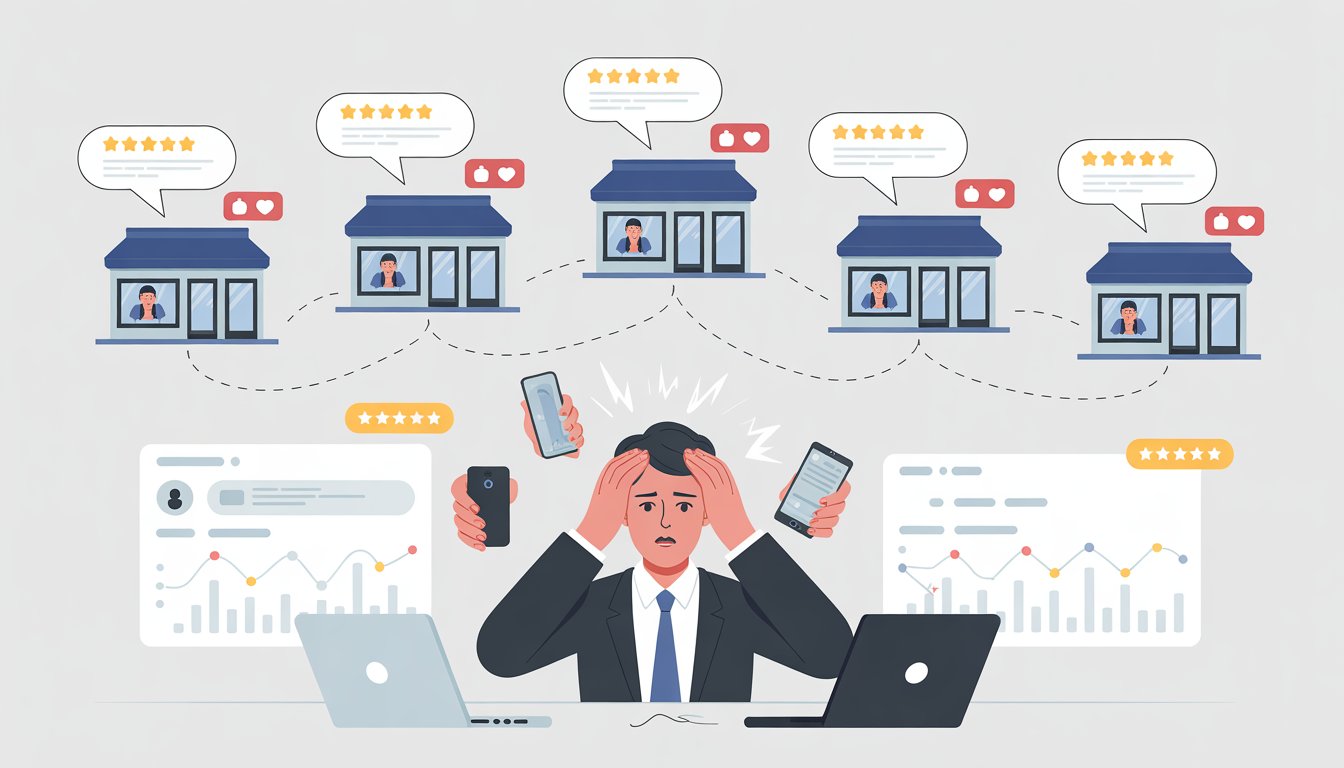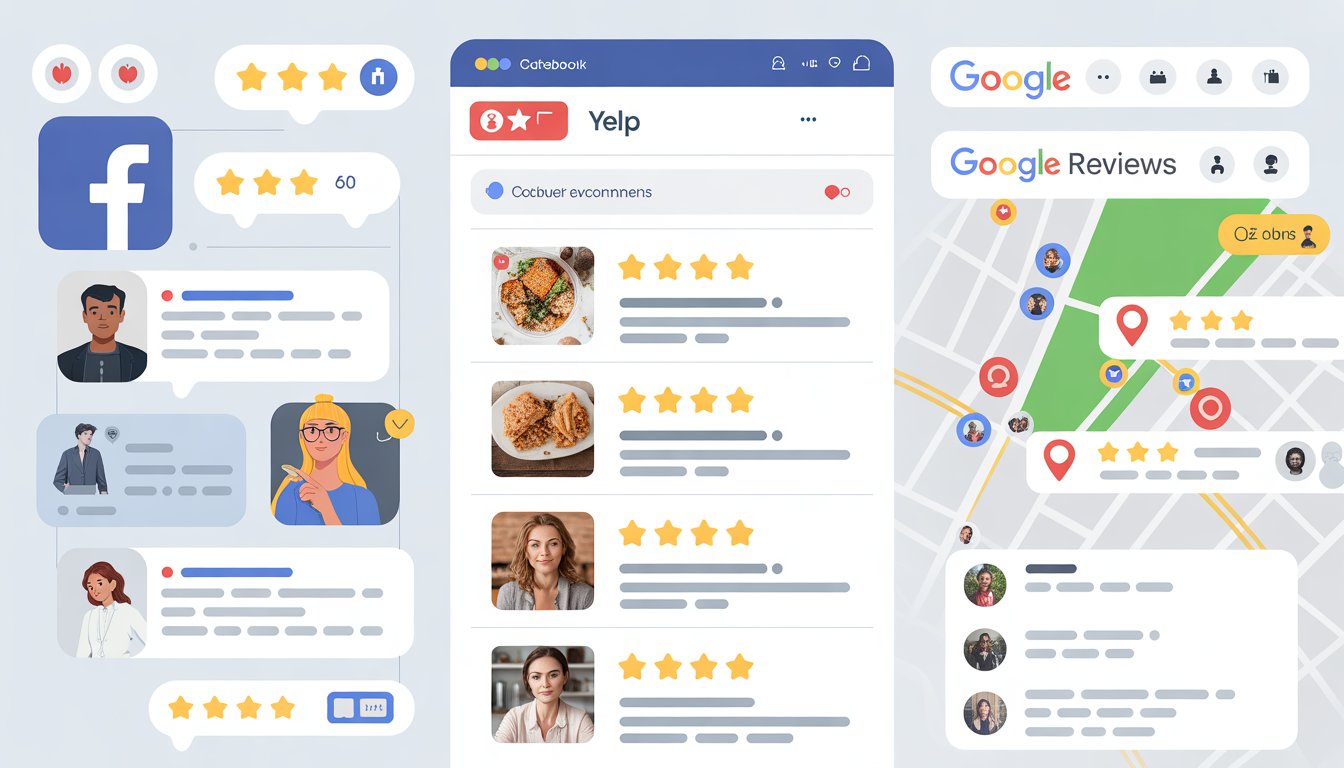Many business owners wonder if adding keywords to their review responses can help their SEO rankings. The short answer is yes, but it requires a thoughtful approach that looks natural and provides real value to readers.

Using relevant keywords in your Google review responses can boost your local SEO rankings when done correctly. Search engines index these responses, which means they can help your business show up in local searches.
However, the key is using keywords naturally within helpful, genuine responses rather than stuffing them in awkwardly. The trick lies in finding the right balance.
You want to include terms that potential customers might search for while still sounding human and addressing the reviewer's actual concerns. When you respond to reviews with this strategy, you create fresh content that search engines can crawl and use to better understand what your business offers.
Key Takeaways
- Keywords in review responses can improve local SEO rankings when used naturally and strategically
- Response optimization works best when you focus on being helpful while subtly including relevant search terms
- Consistent review engagement with keyword-optimized responses helps search engines better understand your business offerings
How Keywords Influence Review Response SEO

Keywords in review responses work through Google's indexing system and contribute to local search relevance signals. They impact your Google Business Profile visibility and help search engines understand what your business offers.
Google's Approach to Indexing Review Content
Google crawls and indexes the text in your review responses just like other web content. The search engine reads both customer reviews and your replies to understand your business better.
Your responses become part of your Google Business Profile's content portfolio. Google uses this text to determine what services you offer and how relevant you are for specific searches.
The algorithm looks for natural keyword usage rather than forced repetition. When you mention "24-hour emergency plumbing" in a response, Google connects that phrase to related searches.
Fresh responses signal to Google that your business is active. Regular engagement with reviews creates new content for the search engine to process and index.
Relevance and Keyword Signals in Local Search
Keywords in responses help establish topical relevance for local searches. When customers search for specific services, Google matches their query with indexed content from your profile.
Your responses can capture unbranded traffic by including service-related terms. A restaurant owner mentioning "gluten-free options" in responses may rank better for those searches.
Relevant keyword examples:
- Service descriptors: "same-day delivery," "pet-friendly"
- Location modifiers: "downtown location," "near the airport"
- Product features: "organic ingredients," "luxury amenities"
The key is using keywords that customers naturally search for. Look at the language in your reviews to find terms people use when describing your business.
Impact on Google Business Profile Visibility
Strategic keyword use in responses can improve your profile's visibility in local search results. Your business becomes more likely to appear when people search for those specific terms.
Keywords help your profile show up in the local pack for relevant searches. This three-business listing appears at the top of search results for location-based queries.
Your responses also influence which search queries trigger your business information. More relevant keywords mean better matching with customer searches.
Visibility benefits include:
- Higher local pack rankings
- Increased profile impressions
- Better search query matching
- Enhanced topical authority
The impact grows when you use keywords consistently across multiple responses. This repetition reinforces your business's relevance for those search terms.
The Role of Review Responses in Local SEO Strategy

Review responses directly strengthen your local SEO by increasing engagement signals and building prominence. Active response management improves your Google My Business rankings and boosts click-through rates from local search results.
Building Prominence Through Engagement
Responding to reviews helps build prominence in local search results through increased activity signals. Google tracks how often businesses engage with customers on their profiles.
When you reply to reviews consistently, it shows your business is active and engaged. Engagement metrics that matter:
- Response frequency
- Response speed
- Quality of replies
- Customer follow-up interactions
Active review management creates more content on your Google My Business profile. Each response adds fresh text that Google can analyze.
This ongoing activity helps maintain an active business presence. Prominence also grows when customers see you care about feedback.
People are more likely to leave reviews when they see businesses respond to others. This creates a cycle that builds your online reputation over time.
Improving Click-Through Rate with Active Replies
Review responses can boost your click-through rate from local search results. When potential customers see thoughtful replies to reviews, they feel more confident about choosing your business.
This confidence leads to more clicks on your listing. Studies show that businesses responding to reviews get more engagement.
Customers trust businesses that communicate openly with previous clients. Your responses show you handle both positive and negative feedback professionally.
Key benefits for click-through rates:
- Builds customer trust
- Shows business is responsive
- Demonstrates good customer service
- Creates social proof
Quick responses to negative reviews can prevent damage to your reputation. When people see you address problems quickly, they are more likely to give your business a chance.
Influence on Google Maps Rankings
Review responses affect your position in Google Maps results and the local pack. Google considers engagement as a ranking factor for local businesses.
Regular responses signal that your business is active and customer-focused. The local pack shows the top three businesses for local searches.
Active review management helps you compete for these valuable spots. Businesses that respond to reviews often rank higher than those that ignore customer feedback.
Ranking factors influenced by responses:
- Engagement signals
- Profile completeness
- Customer interaction quality
- Response consistency
Google Maps rankings improve when you maintain steady communication with customers. Each response adds to your overall engagement score.
Your response quality matters too. Generic replies provide less value than personalized responses that address specific customer points.
Best Practices for Using Keywords in Review Responses
Using keywords in your review responses requires a careful balance between SEO benefits and maintaining authentic customer relationships. The key is to incorporate relevant terms naturally while keeping your responses genuine and helpful to both reviewers and future customers.
Writing Natural and Relevant Responses
Your Google reviews responses should sound conversational and helpful. Keywords work best when they flow naturally into your replies.
Use specific terms that describe your services or location. For example, mention "24-hour service" or "downtown location" when these details relate to the customer's experience.
Avoid these common mistakes:
- Repeating your business name multiple times
- Forcing keywords into every sentence
- Using the same keywords across all responses
Focus on one or two relevant keywords per response. This approach keeps your replies readable while still supporting your online presence.
Choose keywords that match what the reviewer mentioned. If they praised your "quick delivery," you can naturally reference your "fast shipping service" in your thank-you response.
Balancing Keyword Integration with Authenticity
Your responding to Google reviews strategy should prioritize genuine customer connections over keyword density. Authentic responses build trust with potential customers reading your reviews.
Write your response first without thinking about keywords. Then review it to see where you can naturally add relevant terms.
Effective keyword integration looks like this:
- "Thank you for choosing our pet-friendly hotel for your family vacation"
- "We're glad our certified technicians solved your plumbing issue quickly"
Never sacrifice the personal touch for SEO. Address the reviewer by name and reference specific details from their experience.
Remember that Google can detect keyword stuffing in review responses. Keep your replies helpful and conversational to maintain your search rankings and customer relationships.
Responding to Positive and Negative Reviews for SEO Benefit
Both positive and negative reviews offer unique SEO advantages when you respond strategically. Your responses to customer feedback create fresh content that search engines can index while demonstrating active engagement with your audience.
Maximizing Value from Positive Reviews
Responding to positive reviews helps you naturally include relevant keywords while showing appreciation for customer feedback. When you reply to a five-star review, mention your business name, location, and specific services the customer praised.
Thank customers by name and reference details from their experience. This creates authentic content that search engines value.
Your responses should feel genuine while incorporating terms that potential customers might search for. Key elements to include:
- Business name and location
- Specific services mentioned
- Gratitude for the customer experience
- Invitation for future visits
Search engines see these responses as fresh, relevant content. The natural keyword usage in your replies can improve your rankings for local search terms.
Turning Negative Reviews Into Opportunities
Negative reviews become SEO assets when you handle them professionally. Your response shows both search engines and potential customers that you care about customer experience and online reputation.
Address concerns directly and offer solutions. Use keywords naturally while focusing on resolution.
Effective response strategy:
- Acknowledge the issue quickly
- Apologize for poor customer experience
- Offer specific solutions
- Include relevant business keywords naturally
- Invite offline conversation when appropriate
Professional responses to negative feedback can actually boost your credibility. Search engines favor businesses that engage with all types of customer feedback consistently.
Optimizing Your Google Business Profile Through Review Engagement
Fast response times and regular review engagement help your Google Business Profile gain better visibility in local search results. These practices also create a feedback loop that brings in more customer reviews over time.
Timeliness and Consistency of Responses
Google tracks how quickly you respond to reviews on your Business Profile. Businesses that reply within 24-48 hours show higher engagement signals to the search engine.
Set up notifications for new reviews so you can respond right away. You can do this through the Google Business app on your phone or through email alerts.
Quick response benefits:
- Shows Google your business is active
- Improves customer trust scores
- Increases chances of getting more reviews
Respond to both good and bad reviews with the same speed. This creates a pattern that Google recognizes as consistent business management.
Keep your responses short but personal. Thank customers by name when possible and mention specific details from their review.
Encouraging More Customer Feedback
Your review responses can motivate other customers to leave their own feedback. When people see you reply to reviews, they know you will read what they write.
Ask happy customers directly for Google My Business reviews after a good experience. Send them a link that goes straight to your review page.
Ways to get more reviews:
- Include review requests in follow-up emails
- Add QR codes on receipts that link to your GMB page
- Post signs in your business asking for online feedback
Make the review process simple for customers. The easier it is to find your Business Profile and leave a review, the more feedback you will get.
Small businesses that respond to 75% or more of their reviews typically see 20-30% more new reviews each month compared to businesses that rarely respond.
Measuring and Refining Your Review Keyword Strategy
To optimize your keyword use in review responses, you need to track your local search ranking changes and adjust your approach based on real data. This process helps you understand which keywords move the needle for your business.
Tracking Local Search Results and Search Ranking Impact
Monitor your Google My Business ranking weekly to see how keyword-rich responses affect your position. Check your rankings for different locations within your service area since distance plays a major role in local search results.
Use these tools to track your progress:
- Google My Business Insights - Shows how customers find your business
- Google Search Console - Tracks which keywords bring traffic
- Local rank tracking tools - Monitor positions for specific keywords and locations
- Manual searches - Check your rankings from different devices and locations
Track these key metrics:
MetricWhat It ShowsAverage positionYour ranking for target keywordsClick-through rateHow often people click your listingPhone callsDirect response to your visibilityDirection requestsLocal engagement levels
Set up monthly reports to compare your rankings before and after using keywords in responses. Note which specific keywords in your responses correlate with ranking improvements.
Adapting Responses Based on Performance Data
Review your tracking data every month to identify patterns in keyword performance. Focus more effort on keywords that show clear ranking improvements and reduce emphasis on those that don't move your position.
Test different keyword variations in your responses. If "phone repair" doesn't boost rankings, try "cell phone repair" or "mobile device repair" in future responses.
Adjust your strategy based on these findings:
- High-performing keywords - Use them more often in responses
- Low-impact terms - Replace with better alternatives
- Seasonal changes - Adapt keywords based on trending searches
- Competitor analysis - See what keywords work for similar businesses
Keep a simple spreadsheet tracking which keywords you used in responses and corresponding ranking changes. This data helps you refine your review management approach over time.
Update your keyword list quarterly based on performance data and new customer language patterns in recent reviews.
Frequently Asked Questions
Using keywords in review responses can help your local SEO rankings when done correctly. The key is finding the right balance between natural language and search optimization while avoiding common mistakes that could hurt your rankings.
How can incorporating keywords in business response to reviews impact search engine rankings?
Keywords in review responses can boost your local search visibility. Google uses this content to understand what your business offers and when to show you in search results.
Your responses become part of your Google Business Profile content. This helps Google match your business to relevant search terms when customers look for services in your area.
The impact works best for local searches like "dentist near me" or "plumber in Chicago." National businesses targeting broader keywords see less benefit from review response optimization.
Fresh keyword content in responses signals to Google that your business stays active. This activity can improve your position in local search results over time.
What are best practices for including keywords in responses to online reviews?
Use keywords naturally in your responses without forcing them. Aim for no more than two keywords per response to avoid sounding robotic or spam-like.
Focus on long-tail keywords that customers actually use. If someone mentions "oil change" in their review, you can naturally reference "oil change service" in your response.
Respond to every review quickly and thoroughly. Google values businesses that engage with customers consistently.
Make your responses personal and specific to each reviewer's experience. This creates natural opportunities to include relevant keywords.
Are there any risks associated with using keywords in review responses for search engine optimization?
Keyword stuffing in responses can hurt your rankings and damage customer relationships. Google can detect when responses sound unnatural or overly promotional.
Using the same keyword-heavy template for all responses looks fake to both Google and potential customers. This approach can reduce trust in your business.
Over-optimization might trigger spam filters in Google's algorithm. This could negatively impact your local search visibility.
Focusing too much on keywords can make you ignore the actual customer feedback. This reduces the value of your customer service efforts.
What alternative strategies can businesses use to improve their SEO without relying on keywords in reviews?
Building a complete Google Business Profile with photos, hours, and services provides stronger SEO benefits than keyword-focused review responses. Focus on these foundational elements first.
Encouraging more customer reviews naturally improves your search rankings. The quantity and quality of reviews matter more than keyword optimization in responses.
Creating FAQ pages on your website targets the same keywords more effectively. These pages give you more space and control over your keyword strategy.
Publishing regular content like blog posts or service pages builds stronger keyword authority. This approach offers better long-term SEO results.
How does the sentiment of review responses influence SEO in addition to keyword usage?
Positive, helpful responses to negative reviews can improve your conversion rates from search results. Potential customers read how you handle problems before choosing your business.
Professional responses to all reviews build trust signals that Google considers for local rankings. Businesses that engage positively with customers often rank higher in search results.
Detailed responses to negative reviews provide context that helps your reputation. This indirectly supports your SEO by maintaining customer confidence.
Quick, thoughtful responses show Google that you care about customer experience. This engagement factor can influence your local search performance.
Can the frequency of keyword usage in review replies affect the SEO performance of a business?
Using keywords in every single response can trigger spam detection algorithms.
Google prefers natural variation in your response content and language patterns.
Responding consistently to reviews matters more than keyword frequency.
Regular engagement with customers signals active business management to Google's ranking system.
Quality responses with occasional keyword use perform better than frequent keyword stuffing.
Focus on helping customers rather than hitting specific keyword targets.
Your overall keyword strategy should span multiple platforms and content types.
Review responses should support but not carry your entire SEO keyword strategy.









